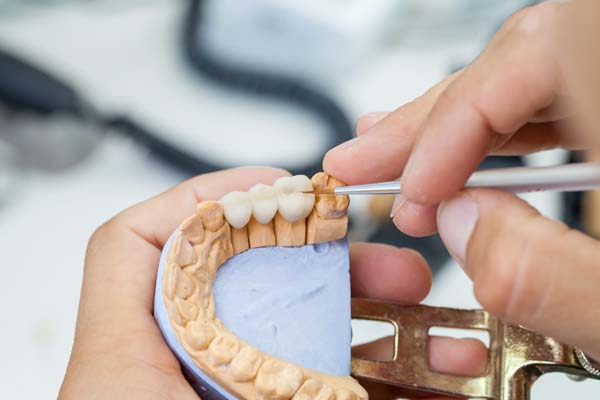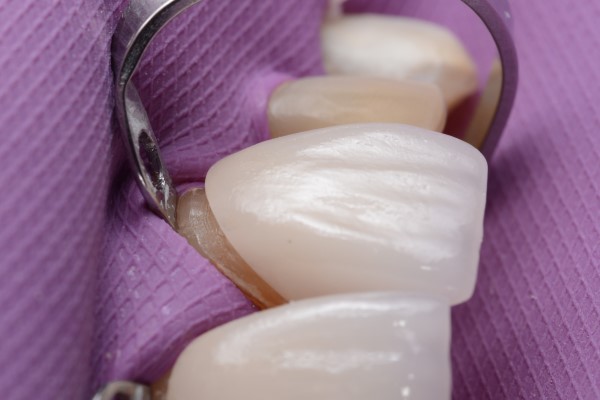How Many Missing Teeth Can a Dental Bridge Replace?

When it comes to replacing missing teeth, you can choose between options like dentures, a dental bridge, and dental implants. The last thing you want to do is leave the missing teeth unreplaced as it can have undesirable consequences on oral health. This article explains what a dental bridge is, how it works, and how many teeth can be restored at one time.
Replacing missing teeth with a dental bridge
One of the questions patients often have is related to the number of teeth that can be replaced with a dental bridge. The answer to this is complicated since there are different kinds of scenarios that could play out. The application of a dental bridge depends on the patient’s age, bite, and the condition of the adjacent teeth.
For resin-bonded bridges, only one tooth is ideal for the highest rate of success. For regular bridges, it is possible to have a larger number of missing teeth — the dentist can have six teeth on the bridgework connected to two teeth. To get more information on what is possible, patients will need to discuss with the dentist and undergo a dental evaluation. Any tooth on the jaw can be replaced with a bridge, but it is preferable to use them for front teeth where there is minimal use of chewing force.
Types of dental bridges
A conventional bridge involves the use of crowns to hold the bridge in place. It requires filing down two adjacent teeth to anchor the bridge. This type of bridge is effective because it has a high success rate, but some tooth preparation will be necessary. If the teeth on either side already have crowns or need it, even better.
Another type of dental bridge is the adhesive bridge. With recent improvements in dental technology, the dental cement used for bonding is stronger. This allows the dentist to bond the false tooth to existing natural teeth without removing part of their structure. This type of bridge, also called resin-retained bridges, is more conservative. However, they can only be used in certain conditions and are not practical for the back teeth.
The process of getting a dental bridge
The dentist will assess the patient’s situation, take scans, and then talk about the different options, as well as their benefits and drawbacks. With the proper information, patients can decide the best option for them.
The dentist will prepare the teeth (if necessary) before taking impressions that will be used to fabricate a custom dental bridge. The final step entails examining the final bridge to verify that the fit, build, bite, and aesthetics are according to specifications. Once the dental bridge is cemented, the dentist will provide instructions on maintenance.
Do you currently have missing teeth?
When constructed properly, a dental bridge can survive several years of use. The type of bridge used typically determines the number of teeth that can be replaced at once by the bridge. The goal of treatment is to ensure that the final restoration has adequate support on the jaw to handle day-to-day dental functions. If you would like to find out more about this tooth replacement option, contact our dental office today to book an appointment.
Request an appointment here: https://www.gearydental.com or call Geary Dental Center at (415) 702-1310 for an appointment in our San Francisco office.
Check out what others are saying about our dental services on Yelp: Dental Bridges in San Francisco, CA.
Recent Posts
A traditional dental bridge can replace up to three or four consecutive teeth on the same side of a dental arch. It is one of the most common dental replacements you can get. Knowing how to care for it can help maintain your new smile for a long time. Here are some tips for ensuring…
A dental crown is a device used to restore the functions and look of a tooth that has been damaged. If you need a root canal, a fractured tooth, or a big filling, your dentist may also decide to place a dental crown. The new crown covers the part of the tooth visible above the…
Dental laser therapy uses cutting-edge technology that has transformed the field of dentistry by providing less invasive and more precise treatment options. This innovative approach uses focused light energy to perform various dental procedures with increased comfort and efficiency. From treating gum disease to accelerating teeth whitening, dental laser therapy offers numerous benefits over traditional…
Dental veneers have become an increasingly popular choice for patients looking to improve the appearance of their smiles. A veneer can enhance the color and shape of your teeth, providing a more uniform and aesthetically pleasing smile. However, they are not a one-size-fits-all solution; certain factors determine whether someone is a good candidate. Patients should…


